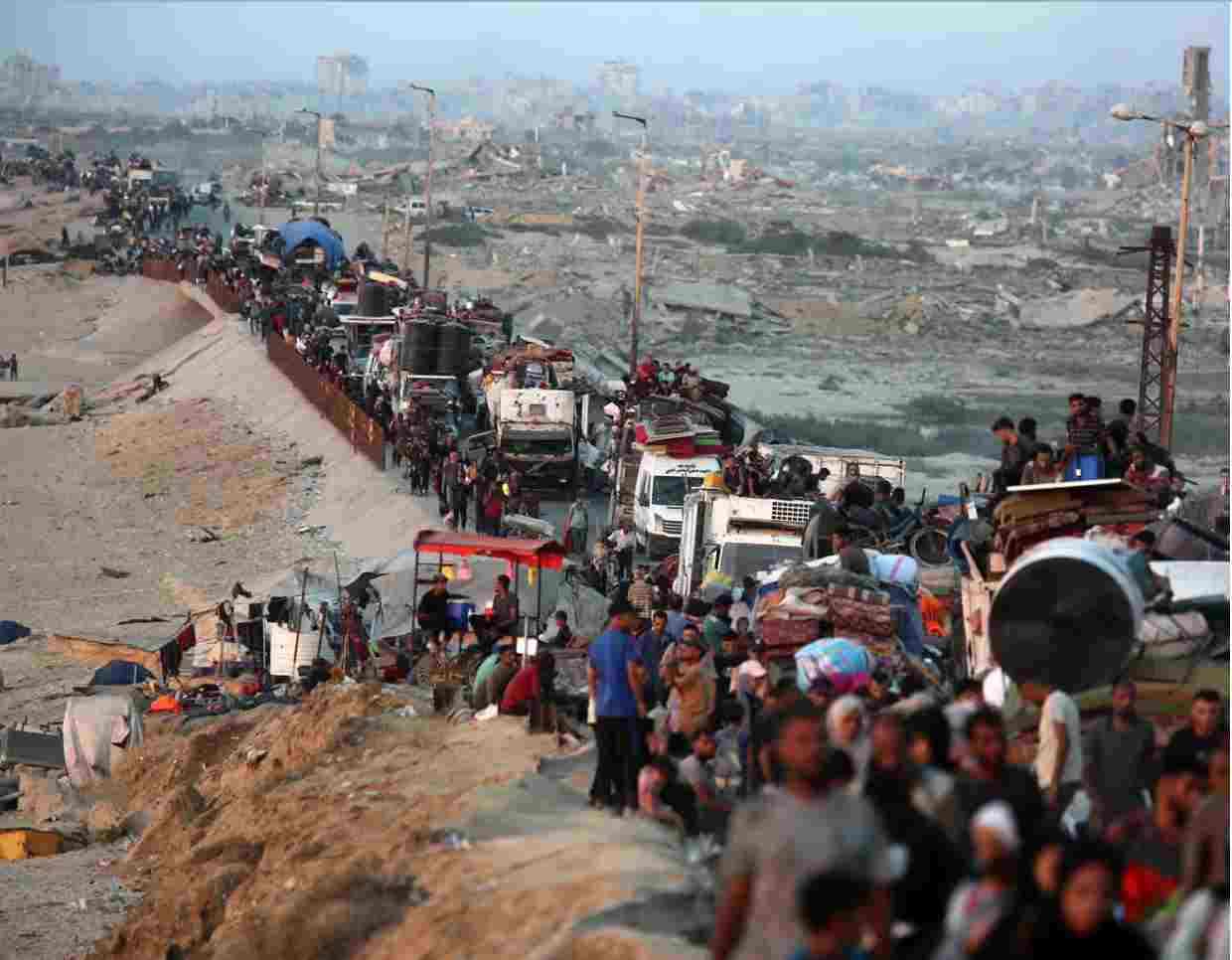
Hamas ponders options while countries rush to welcome Trump’s peace plan to Gaza. The Israeli media and politicians show ample support, while the far right of Israel and the Islamic jihad express skepticism
Hamas said it will revise the outline of the Gaza Peace Plan presented by Donald Trump in Washington yesterday, while leaders from the Middle East and other places expressed support for the proposal, which emerges after almost two years of relentless violence.
In Israel, the media and politicians welcome Benjamin Netanyahu’s announcement, made at a joint press conference with Trump, that he supported the 20 -point plan, which meets many of Israel’s main demands.
Hamas authorities said they would discuss the proposal internally and with other Palestinian factions before responding.
A source from Hamas told AFP news agency that the group had “started a series of consultations within their political and military leaders, both within Palestine and abroad,” which “would take several days due to the complexities of communication between leadership members and movements.”
The 20 -point plan provides for Hamas’s disarmament and prohibits it from any future political role in Gaza. It requires the militant Islamic organization to free the Israeli hostages that still maintain in its power-of which it is believed that less than half is still alive-within 72 hours after the ceasefire is entry into force, but foresees the gradual removal of the Israeli military forces for a perimeter and an increase in humanitarian aid, desperately necessary for the 2.3 million, desperately needed inhabitants of the devastated territory.
It also requires Israel to free more than 1,000 Palestinian prisoners, including many who fulfill life prison sentences.
Foreign leaders, painfully aware of the failure of several previous ceasefire efforts, ran to offer support on Tuesday.
German Chancellor Friedrich Merz said Trump’s plan was the “best chance to end war,” while French President Emmanuel Macron greeted “the president’s commitment to ending the war in Gaza and ensuring the release of all hostages.” Moscow also supported the proposal.
However, it is the support of regional powers such as Türkiye, Egypt, Qatar and Jordan that will bring failure or success, as they can press Hamas to accept the proposal.
A Qatar authority said Qatar would meet with Hamas and Turkey on Tuesday to discuss the plan.
The Palestinian Authority, which exercises partial authority on parts of Israel’s occupied, but can play a role in a postwar Gaza government, welcomed Trump’s “sincere and determined efforts”.
However, Palestinian factions combined with Hamas seemed to reject the plan initially, according to local media reports, and a source close to Hamas told Reuters that he was “completely biased about Israel” and imposed “impossible conditions” that aimed to eliminate the group.
The Islamic Jihad, Hamas ally, said the plan would encourage new aggressions against the Palestinians. “With this, Israel is trying – through the United States – imposing what he failed through the war,” the group said in a statement.
In Israel, many commentators welcomed the proposal well and those who usually support Netanyahu were careful to highlight last-minute concessions that, according to them, the Israeli Prime Minister had obtained.
In a video statement published on his Telegram channel after his joint press conference, Netanyahu stated that the military would remain most of Gaza and added that he had not agreed with a Palestinian state during his conversations with the US president. “We will recover all our hostages, alive and well, while the [militares israelenses] They will remain in most of the Gaza Strip, ”he said.
Israelis marching earlier this month in Jerusalem, in a demonstration organized by the hostage families in Gaza. | Menahem Kahana/AFP/Getty Images
Extreme right ministers, however, promised to leave the ruling coalition if Netanyahu interrupts the Israeli offensive in Gaza without reaching a “total victory.” Bezalel Smotrich, Israel’s Finance Minister, said the plan was a “resounding diplomatic failure” that would “end in tears.”
Dr. Ofer Gutarman, an analyst at the Institute of National Security Studies in Tel Aviv, said Israel has changed its “paradigm” and now sees the Arab states as potential partners. “So far, Israel’s strategy was based on a confrontation between Israel and Hamas, to be resolved basically through military effort,” he said.
The pressure on Hamas to accept the agreement will be intense. Pakistan, Jordan, United Arab Emirates, Indonesia, Turkey, Saudi Arabia, Qatar and Egypt issued a joint statement supporting Trump’s plan and claiming to be ready to work constructively with the US and other countries to ensure peace.
The 20-point plan would put Gaza under international control, mobilize an international security force, and would install a “Peace Council”, led by Trump and including former British Prime Minister Tony Blair, to supervise administration and reconstruction.
An international security force would maintain the order and train the Palestinian police to assume the application of the law. Egypt said it is training thousands of Palestinian police officers to be sent to Gaza.
In Gaza, Israeli forces continued their offensive, with tanks advanced into the city of Gaza amid intense bombing in residential neighborhoods. Nine people, including one woman and five of her children, were killed in two separated attacks in the central city of Deir Al-Balah.
Hunger and malnutrition deaths in Gaza increased to 453, including 150 children, according to health officials. Hunger was declared in some parts of the territory last month.
The war began after the Hamas attack to Israel on October 7, 2023, which killed 1,219 people, mostly civilians, and in which more than 250 hostages were made.
The Israeli offensive reduced much of Gaza to rubble and killed 66,055 Palestinians, mostly civilians. More than 160,000 are believed to be injured.
Originally published by The Guardian on 09/30/2025
By Jason Burke in Jerusalem
Source: https://www.ocafezinho.com/2025/09/30/sob-pressao-hamas-estuda-plano-de-paz-para-gaza/

